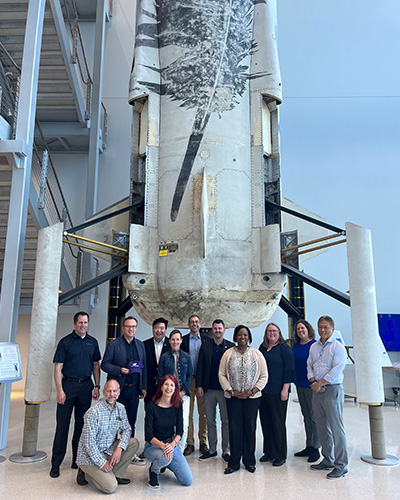December 4, 2023
Earlier this year, the ME External Advisory Board (EAB) visited the Blue Origin facility and the NASA Kennedy Space Center in Florida, where they connected with alumni and met with partners that provide students with opportunities to prepare for successful careers. It was the first time the advisory board traveled together to a destination.

A group of External Advisory Board members at the Blue Origin facility in Florida.
Composed of 20 distinguished alumni and friends of the department from a variety of industries, the EAB provides counsel to department leadership, mentoring to students, volunteer leadership in experiential-learning programs, advocacy for the department and vital connections to industry.
“Seeing our impact at a company like Blue Origin, learning about their workforce needs and witnessing our alumni become industry leaders underscores the influence that the ME department has,” says ME Chair and PACCAR Professor in Engineering Alberto Aliseda. “The EAB is steering the department’s mission to create a workforce of engineering leaders.”
EAB member Justin Brynestad (B.S. ’03), senior director of program management at Blue Origin, invited the board to tour the company’s facilities. Learning about Blue Origin’s mission was “awe-inspiring,” says Colleen McClure, chair of the EAB and retired Boeing leader.
The visit also provided an opportunity for alumni to “reconnect with the ME department and understand the current research areas, industry partnerships, laboratory and manufacturing facilities, curriculum and more,” Brynestad says. The board had lunch with UW alumni at Blue Origin who now work to establish relationships with the UW and recruit students.
In addition to visiting Blue Origin, part of the group toured the Kennedy Space Center, one of NASA’s field centers. They visited with ME alumni who work at NASA and toured the launchpad, assembly facilities, control tower, visitor center and museum.
“At Blue Origin and the Kennedy Space Center, the alums were gracious, enthusiastic about engineering challenges and passionate about their work,” McClure says. “We saw firsthand how ME is providing students with a launching pad to careers that will sustain them for 25 to 30 years.”
“It’s so important for us to see how ME skills are put to work and to hear from the engineers themselves so we can understand what programs are fundamental to their success”
The importance of industry connections
Most ME graduates work as leaders in engineering and industry, Aliseda says, so part of the EAB’s role is to ensure that ME prepares students for current industry needs.
“This visit highlighted the need for a workforce that understands the challenges of designing and manufacturing one-of-a-kind machines using state-of-the-art materials that have to perform under extraordinary circumstances,” Aliseda says. “These experiences remind us of why we are engineers, scientists and educators.”
“It’s so important for us to see how ME skills are put to work and to hear from the engineers themselves so we can understand what programs are fundamental to their success,” says McClure. “It helps us see areas that can be developed.”
Partnerships between industry and the ME department benefit students, faculty and companies. Industry can connect with students about internship and job opportunities, sponsor capstone projects that provide real-world experience for students and more. Blue Origin is one of ME's industry partners.
“We collaborate in student competitions, design capstones, sponsor research, recruit for internships and are one of the largest employers of UW Mechanical Engineering graduates,” Brynestad says. “I got involved with the EAB as an opportunity to give back, as well as stay connected with the latest in technology, research and innovation among top students and faculty.”
With access to a broad curriculum that includes topics such as propulsion, controls, advanced materials and machine learning, ME students learn skills that enable them to succeed in aerospace careers.
“Aerospace products involve integrating many complex systems, and ME students are well-positioned to lead multi-disciplinary teams,” says Brynestad.